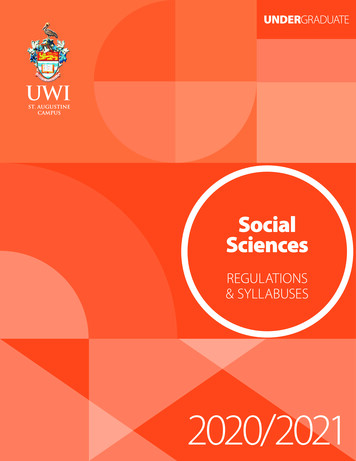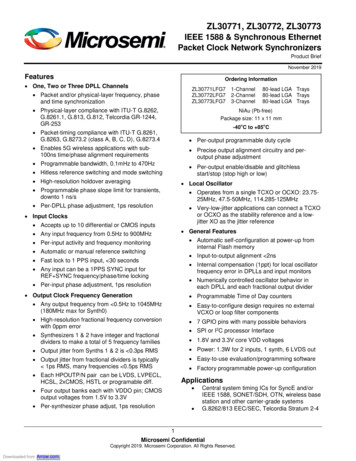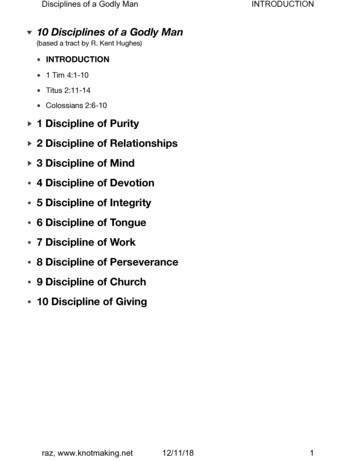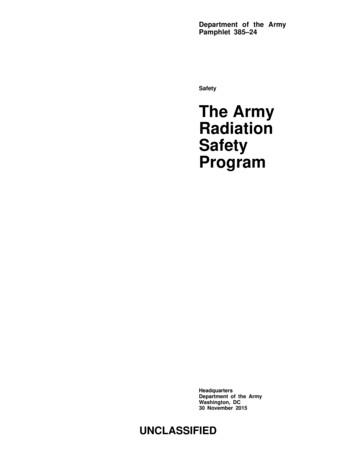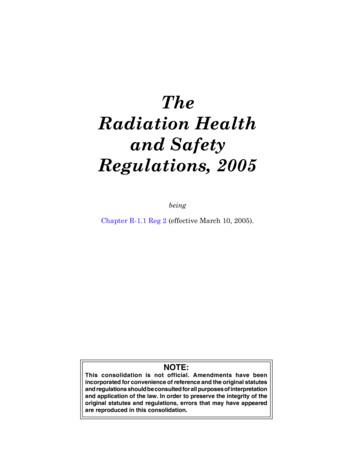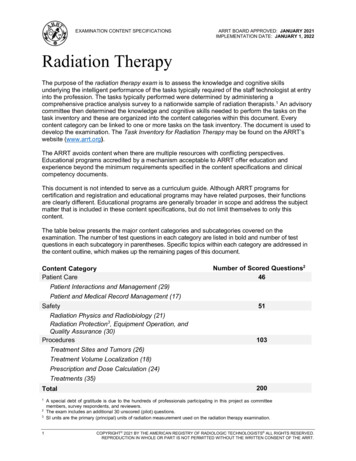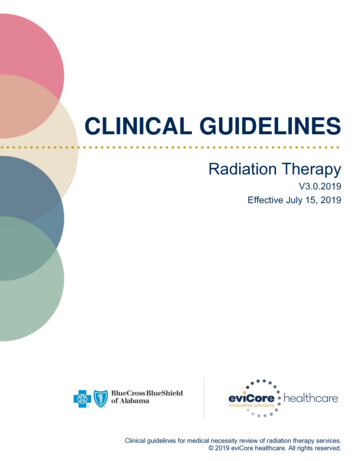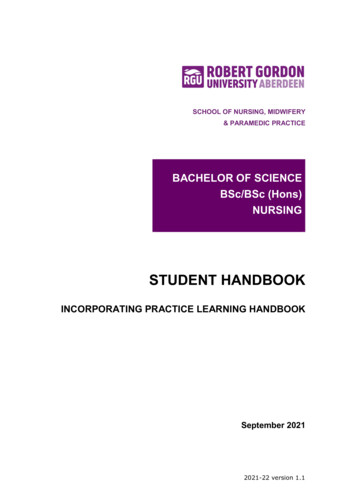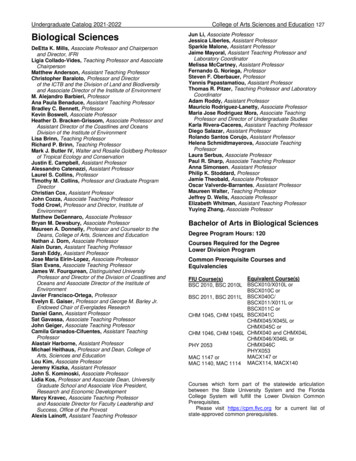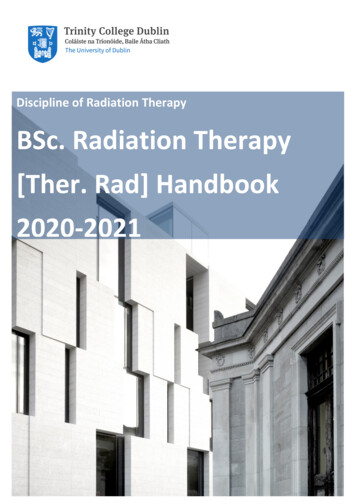
Transcription
Discipline of Radiation TherapyBSc. Radiation Therapy[Ther. Rad] Handbook2020-2021
Table of ContentsStaff Contact Details. 4Contact Details In Case of Emergency. 51.0 Introduction . 61.1 The Profession of Radiation Therapy . 71.2 National and European Professional Body . 72.0 General School Information . 92.1 Overview of Discipline of Radiation Therapy . 92.2 Teaching Philosophy: Discipline of Radiation Therapy . 102.3 Discipline website . 112.4 Student Representation . 112.5 Departmental Meetings . 113.0 Programme Overview . 133.1 Programme Aims . 133.2 Programme Learning Outcomes . 133.3 Progression through the Programme . 133.4 Programme structure . 143.4.1 Important Information on COVID-19 Restrictions and Modes of Teaching andLearning . 143.5 Programme award . 153.6 Junior Fresh . 163.7 Senior Fresh . 173.8 Junior Sophister . 183.9 Senior Sophister . 193.10 Clinical Placement . 203.11 Health and Safety . 223.11.1 Vaccination Requirements . 233.11.2 Cross infection in the Clinical Environment . 243.12 Senior Sophister Capstone Project . 253.12.1 Supervision . 253.12.2 Submitting to conferences or meetings . 254.0 Disciplinary Procedures . 261
5.0 Programme Regulations and College Policy Statements . 275.1 Privacy Statement for GDPR . 275.2 Standards of Conduct . 325.3 Attendance . 335.4 Non-satisfactory attendance and course work . 355.5 Environment. 365.6 Mobile phones . 365.7 E-mail . 365.8 Internet Usage . 375.9 Social Networking and Social Media. 375.10 Submission of assignments . 375.11 Deadlines for submissions . 395.12 Extension to Assessment Submission Date . 395.13 Referencing . 395.14 Word Count. 405.15 Student Travelling Aboard with College . 406.0 Communication . 416.1 Blackboard Learn- Virtual Learning Environment . 416.2 Student Information System (SITS) . 416.3 How the Discipline communicates with you . 416.4 Your contact details . 427.0 Services and Facilities . 437.1 Photocopying and printing . 437.2 Computers . 438.0 Student Support . 448.1 Student Union . 448.2 Tutor System . 448.2 Student 2 Student (S2S) . 448.3 Support provision for students with a disability . 478.4 Careers Advisory Service . 488.5 Student Counselling Services . 508.6 Other College support services. 509.0 Student Learning and Assessment. 519.1 End of year examination . 512
9.2 Essay . 529.3 Multiple Choice Questions (MCQs). 529.4 Project work . 529.5 Workbook / Portfolio . 539.6 Oral presentations . 539.7 Understanding the Question . 5310.0 Style Guide for Written Assignments . 5411.0 Referencing . 5911.1 Why Reference? . 5911.2 What is the difference between ‘References’ and ‘Bibliography’?. 5911.3 How to Reference . 5911.4 Referencing software . 6011.5 How to insert citations . 6012.0 Plagiarism . 6212.1 Plagiarism Review . 6713.0 Foundation and Non-Foundation Scholarship . 6813.1 Foundation Scholarships (selected abstracts from the College Calendar) . 6813.2 Non-foundation Scholarships . 6913.3 Award . 6913.4 Radiation Therapy . 6913.5 Procedure for application . 7013.6 Announcement of Results . 7113.7 Radiation Therapy Contact . 7114.0 General Indication on Grade Standards . 72Appendix 1: Academic Year Structure. 76Appendix 2: Clinical Placement Year Timetable . 77Appendix 3: Code of Conduct Policy . 79Appendix 4: European Credit Transfer System . 84Appendix 5 Junior Fresh Module Information . 85Appendix 6: Senior Fresh Module Information . 87Appendix 7: Junior Sophister Module Information . 90Appendix 8: Senior Sophister Module Information . 92Appendix 9: COVID-19 Guidance for Trinity Centre, SJH . 933
Staff Contact DetailsStaffRole and titleTelephone EmailAssociate Prof.Michelle Leech (Dr)Head of Discipline,01 8963252leechm@tcd.ieAssociate Prof.Laure Marignol (Dr)Deputy Head of Discipline,01 8963255marignl@tcd.ieAssociate ProfessorHead of Research,Associate ProfessorAssistant Prof.Elizabeth FordeAssistant Professor01 8963250eforde@tcd.ieAssistant Prof.Maeve KearneyAssistant Professor01 8963926mkearne@tcd.ieAssistant Prof.Gerard Menezes(Dr)Assistant Professor01 8963924gerard.menezes@tcd.ieAssistant Prof.Laura MullaneyAssistant Professor01 8963254laura.mullaney@tcd.ieAssistant Prof.Anita O’Donovan(Dr)Assistant Professor01 8963149anita.odonovan@tcd.ieAssistant Prof.Claire PooleHead of Clinical Education01 8962973poolec@tcd.ieAssistant Prof.Sarah BarrettAssistant Professor01 8963248barrets7@tcd.ieMs. Daléne DougallExecutive Officer01 8963234dougallm@tcd.ieAssociate Prof.Mary CoffeyAdjunct AssociateProfessor01 8963234mcoffey@tcd.ieAssistant ProfessorAll the staff offices are located on the 2nd floor of the Trinity Health Science Building in thecampus of St James’s Hospital, Dublin 84
Contact Details In Case of EmergencyIn the event of an emergency, dial Security Services on extension 1999. Security Servicesprovide a 24-hour service to the college community, 365 days a year. They are the liaison tothe Fire, Garda and Ambulance services and all staff and students are advised to alwaystelephone extension 1999 ( 353 1 896 1999) in case of an emergency.Should you require any emergency or rescue services on the Trinity Centre for HealthSciences, St. James’s Hospital campus, you must contact Security Services on ( 353 18962147). This includes chemical spills, personal injury or first aid assistance.It is recommended that all students save at least one emergency contact in their phoneunder ICE (In Case of Emergency)5
1.0 IntroductionThis handbook applies to all students taking B.Sc. in Radiation Therapy taught by theDiscipline of Radiation Therapy in the School of Medicine. The aim of this handbook is toprovide you with information relating to the College and College policy, specific informationrelating to the Discipline of Radiation Therapy, a comprehensive course outline, what isexpected of you on this programme and the academic and personal supports available toyou. The handbook also contains specific information to Covid-19 and its impact on theDiscipline of Radiation Therapy on the Trinity Centre for Health Sciences, St. James’sHospital Campus (Appendix 9). Alternative formats of the Handbook are available onrequest.The information contained in this document is correct at the time of publication, but may besubject to review from time to time. This is particularly likely in the case of the Covid-19information as this will be updated in line with NPHET and Public Health guidance. It isimportant to regularly check the handbook for updates. Students are reminded that theyshould refer to the University Calendar Parts I & II (2020-2021), for further details of GeneralRegulations. In the event of any conflict or inconsistency between these GeneralRegulations published and information contained in programme or local handbooks, theprovisions of the General Regulations in the Calendar will prevail.The Discipline of Radiation Therapy, School of Medicine, is located in the Trinity Centre forHealth Sciences, St. James’s Hospital Campus. The Radiation Therapy course provided by theDiscipline is a four year honours degree at Irish National Framework of Qualifications (NFQ)Level 8 and at European Qualifications Framework for Lifelong Learning (EQF) Level 6 1. Thisprogramme is accredited by the Radiography and Radiation Therapy Board of CORU andsubject to review of the CORU standards of proficiency at regular periods. Graduates of thisprogramme may apply to become registrants of the Radiographers’ and Radiation1https://bit.ly/2OPDwzr6
Therapists’ register of CORU, a requirement to work as a radiation therapist in the Republicof Ireland2.The major objective of the course is to enable students to become competent, autonomousprofessional radiation therapists. This course is the only undergraduate programme offerednationally and, in this context, clinical placements may take place in all the radiation therapydepartments in the country. Lectures will take place on the main College Campus and in theDiscipline of Radiation Therapy on the St. James’s Hospital Campus. In the Junior Fresh yeara higher percentage of the lectures are delivered on the College Campus with fewerdelivered in the Discipline. This decreases through the Senior Fresh and in Junior and SeniorSophister years all lectures take place in the Discipline.1.1 The Profession of Radiation TherapyThe radiation therapist is a member of the multidisciplinary team responsible for thepreparation and delivery of a course of radiation therapy to a cancer patient and for thepsychosocial care of the patient throughout the process. The degree programme willprovide you with the knowledge and skills to analyse, evaluate and make treatmentdecisions as necessary. It will also prepare you to initiate, participate and encourageresearch related to the profession.1.2 National and European Professional BodyMembership of the Irish Institute of Radiography and Radiation Therapy (IIRRT) (theprofessional body representing radiation therapists) and the European Society forRadiotherapy and Oncology (ESTRO) is mandatory. Student membership for the 4 years ofthe IIRRT is 40.00 ( 10 per annum) and this is paid as a once off payment when you initiallyregister in first year. If you decide to remain as a member of the IIRRT after you havegraduated the full annual membership fee will -registration7
Membership of ESTRO is through the IIRRT and is 15 euro per annum. This is due to theIIRRT by November 30th of each academic year. The Executive Officer will provide details asto how this payment is to be made to you by email.The process for JF students to become a member of the IIRRT and the ESTRO RTT Alliance isonline. Please follow the steps below to become a member.1. Go to the following erqueryid 4AF7BEE0-39EB-4579-8E5801DA3CFFB06A&atc aaa&nodeid C21A76F4-4ADD-40C0-A7EC-A36834DA3C312. Please select RT student.3. You will now be guided through each step of the process.4. Once completed you will need to pay the membership fee. This is to be done usingdebit/credit card through PayPal. You do not need a PayPal account and an invoicewill be issued via Paypal once all students have completed the registration process.5. Please note: you may be prompted to download a direct debit form but this doesnot apply to students. For queries regarding Membership applications please e-mailiirrtmembership@gmail.com8
2.0 General School Information2.1 Overview of Discipline of Radiation TherapyMedicine is a School within the Faculty of Health Sciences. Radiation Therapy is a disciplinewithin the School of Medicine, along with the disciplines of Occupational Therapy, HumanHealth and Disease, Human Nutrition and Dietetics and Physiotherapy. The BSc. in RadiationTherapy is a four-year honours degree course, which commenced in Trinity College in 1993.This honours degree gives the broad academic base on which to develop the clinical skills ofradiation therapy. Evaluation, analysis and decision-making are important skills for aradiation therapist and this programme equips students with these core skills. Research inradiation therapy is paramount as a practitioner and upon qualification; graduates will becompetent at undertaking research in this field.There are both theoretical and clinical components to this programme, with clinicalplacement in all four years. Integration between academic studies and clinical placement issupported by a continuing close liaison between academic and clinical radiation therapists.The Discipline of Radiation Therapy aims to provide leadership in radiation therapyeducation, practice and research at local, national and international levels. We stronglysupport the principle of equal access, and encourage all students and staff to achieve theirfull potential within an open, liberal and facilitative environment. The ethos of the Disciplineis one that sees quality in delivery of radiation therapy care to patients as the primary focus.The Discipline of Radiation Therapy delivers a high quality undergraduate programme withan up to date curriculum which is informed and underpinned by evidence-based radiationtherapy practice.The Discipline of Radiation Therapy uses a multi-professional, collaborative approach in theeducation of all undergraduate students. Radiation Therapists, Physicists, RadiationOncologists, Psychologists and Radiobiologists, in collaboration with our colleagues fromSpeech and Language Therapy, Human Nutrition and Dietetics and Dental Science deliveraspects of our programme to ensure that our focus in providing graduates with a holisticapproach to radiation therapy care is met.9
The curriculum is strategically planned to demonstrate integration of theory and practice, toachieve the learning outcomes of the programme. This programme is also in line with theBologna Declaration (1999). All modules are in line with the European Higher EducationArea framework and have been attributed appropriate ECTs for the number of estimatedstudent input hours.All modules on the undergraduate degree programme are inter-linked and are integrated toinform the student in the practice of radiation therapy. Throughout the four years, themodules are delivered at different levels, as outlined in Bloom’s Taxonomy of EducationalObjectives (1956). The levels are arranged hierarchically so that the learning outcomes atany given level incorporate those of the level below. Upon completion of thisundergraduate programme, the student would be expected to demonstrate evidence ofcritical analysis, synthesis and evaluation.Please note that the Psychology and Communication I and II modules are based on Fink’sTaxonomy of Significant Learning (2003), which is non-hierarchical in design and emphasisesthe human dimension, empathy building and caring attributes, as well as knowledge andapplication.Our graduates will be fully prepared both for entry into the profession of radiation therapyand the underpinning of their practice with lifelong learning.2.2 Teaching Philosophy: Discipline of Radiation TherapyThe teaching philosophy of the Discipline of Radiation therapy incorporates the conceptsand principles of andragogy (adult learning) as well as those of holism, dignity, equality andindividuality. The student-lecturer interaction is viewed as one of partnership andcollegiality, with faculty as facilitators of student education and learning. The undergraduateprogramme encourages the development of competent, confident, knowledgeable,reflective and critical practitioners who are prepared to accept professional accountabilitywithin the field of radiation therapy.We believe that student learning is enhanced by the active participation of the student inthe teaching and learning process. Teaching staff of the Discipline of Radiation Therapycreate, facilitate and guide learning opportunities for undergraduate students within a10
positive and non-threatening learning environment. This enables students to developknowledge, attitudes, values and skills necessary to assist patients and their familiesthrough the radiation therapy process.Continuous assessment, with timely feedback (in line with College policy) is usedthroughout the programme, to help students to develop and achieve their potential.The undergraduate curriculum offered by the Discipline of Radiation Therapy provides abalance between lectures, tutorials, practical work, self-directed learning and small groupinteractions. Such teaching and learning methods facilitate personal and professionaldevelopment within the students’ cognitive, effective and psychomotor domains.Throughout the programme you will be invited to provide constructive feedback to themodule co-ordinators. Engaging in this process allows for staff to learn from yourexperiences and provides an opportunity to enhance the quality of the programme3.2.3 Discipline websiteThe Discipline website can be accessed 4 Student RepresentationStudent representatives are appointed following Students’ Union elections and will act asyour representative for the academic year. There will be one student representative peryear.2.5 Departmental MeetingsA full Departmental Meeting will be held once each semester. This consists of all Disciplinestaff and elected student representatives. If there is an issue you would like raised at thislevel, please ask your student representative to place the item on the agenda with uality-assurance/evaluation.php11
Executive Officer, via email, one week in advance of the meeting: items raised after thistime period will not be discussed at the meeting. Issues with specific modules should firstbe raised with the module coordinator. It is the responsibility of the studentrepresentatives to consult with those they are representing prior to the meeting, andafterwards to feed back details of the meeting to them.Departmental meetings will be held via Microsoft Teams and the link to join will bedistributed closer to the date. The dates for the meetings are as follows:12 Monday 16th November 2020 2-3pm Monday 9th March 2021 12-1pm
3.0 Programme Overview3.1 Programme AimsThe aim of this programme is to educate undergraduate students in all aspects of radiationtherapy to produce competent reflective practitioners. A crucial component within theprofession is the ability to think critically, examine practice, problem solve and decisionmake. The approach taken to encourage active learning throughout the programme instilsthese abilities as well as fostering lifelong learning.3.2 Programme Learning OutcomesOn successful completion of the programme you will be able to: Participate fully in and demonstrate competence in all aspects of localisation,verification, treatment set-up and delivery at the level of a graduate radiationtherapist. Integrate fully as a member of the radiation therapy team and demonstrate aprofessional attitude in all aspects of patient care. Critically evaluate and incorporate evidence-based medicine into the practice ofradiation therapy. Reflect on your own professional and personal development, being cognisant of theimportance of life-long learning.3.3 Progression through the ProgrammeProgression through the programme is in line with College regulations.Full details can be found in the College Calendar using the link below:https://www.tcd.ie/calendar/13
3.4 Programme structureThe course will be delivered in eight semesters over four years. The mode of delivery andassessment method is topic dependent and details are provided in the appendices. Theoverall structure of the course is given below. The credit value of a module reflects thecontact hours, independent study, and preparation for tutorials or workshops andassessment. The credit value is assigned a European Credit Transfer System (ECTS) value. Asa rule of thumb 5 ECTS 100-120 hours of student effort (this may include lectures, tutorials,labs, practicals, e-tivites and self-directed learning). For more information on ECTS seeAppendix 4.3.4.1 Important Information on COVID-19 Restrictions and Modes of Teaching and LearningIn order to offer taught programmes in line with government health and safety advice,teaching and learning in Semester 1 for your programme will follow a blended model thatcombines online and in-person elements to be attended on campus. This blended model willinclude offering online lectures for larger class groupings, as well as in-person classes forsmaller groups: the differing modes of teaching and learning for particular modules aredetermined by your home School. Information on the modes of teaching and learning inSemester 2 will be available closer to the time.Trinity will be as flexible as possible in facilitating late arrivals due to travel restrictions, visadelays, and other challenges arising from the COVID-19 pandemic. If you expect to arrivelater than 28th September, please alert your course coordinator as early as possible.For those students not currently in Ireland, according to current Government health andsafety guidelines, please note that these students are expected to allow for a 14-day periodof restricted movement after arrival and prior to commencement of their studies, andtherefore should factor this into their travel plans.For those students currently on the island of Ireland, we remind you of the IrishGovernment’s advice that all non-essential overseas travel should be avoided. If you dotravel overseas, you are expected to restrict your movements for 14 days immediately fromyour return, during which time you will not be permitted to come to any Trinity campus.14
Therefore, as you are required to be available to attend College from the beginning of thenew teaching year on 28 September, please ensure you do not return from travel overseasany later than 13 September.3.5 Programme awardThis full-time four-year programme of honour standard leads to a degree of Bachelor inScience in Radiation Therapy (B.Sc. (Ther. Rad.)) and is at a National Framework ofQualifications Level 8.The final degree award is based on performance in both Sophister years, with eachSophister year contributing 50 per cent to the calculation of the overall degree result forthe current SS class. For the current JS class, your JS year contributes 30 per cent to thecalculation of yout overall degree result in line with changes mandated by the University’sTrinity Education Project. Course work submitted during the Sophister years will be alsoreviewed by the nominated external examiners, prior to the Court of Examiners. Theexternal examiners for 2020/2021 are:Prof. Peter Hoskins,Dr. Joanna Kazmierska,Consultant Clinical Oncologist,Consultant Radiation OncologistMount Vernon Cancer Centre,Greater Poland Cancer Centre,UKPoznan, PolandAssistant Professor Colleen DickieAssistant ProfessorDepartment of Radiation OncologyUniversity of Toronto, Canada15
3.6 Junior FreshThe modules of the Junior Fresh year and their associated credit values s*1From Molecules toCellsBYU1110110Ass. Prof JohnRochford (Dr)Compensatory2Chemistry for LifeSciencesCHU11L0110Asst. ProfRobert Baker(Dr)Compensatory3Anatomy IANU1100315Asst. ProfDenis Barry(Dr)Non-compensatory4Physics for RadiationTherapy 1RTU110055Asst. ProfGerardMenezes (Dr)Non- compensatory5Physics for RadiationTherapy 2RTU110065Asst. ProfGerardMenezes (Dr)Non- compensatory6Principles andPractice of CancerCare IRTU110025Asst. ProfMaeveKearneyNon- compensatory7Psychology andCommunication IRTU11035Asst. ProfAnitaO’Donovan(Dr)Non-
Once completed you will need to pay the membership fee. This is to be done using debit/credit card through PayPal. You do not need a PayPal account and an invoice . radiation therapist and this programme equips students with these core skills. Research in . radiation therapy. 1 4 . 4 Radiation Therapy . 1 Radiation Therapy .
